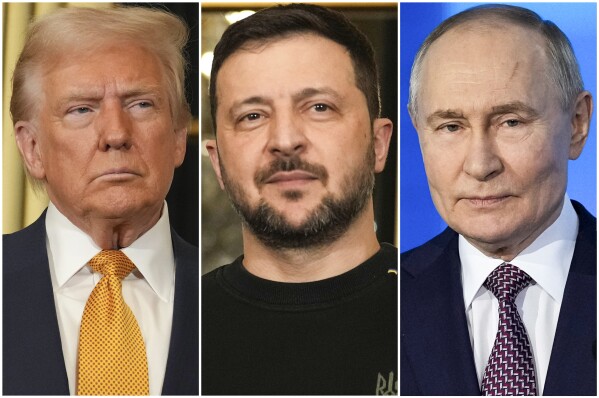WASHINGTON — President Donald Trump announced he will speak separately with Russian President Vladimir Putin and Ukrainian President Volodymyr Zelenskiy on Monday, following tense in-person talks between Russian and Ukrainian delegations in Turkey that ended with no breakthrough toward a ceasefire.

In a statement posted on Truth Social, Trump said he would begin his call with Putin at 10 a.m. Eastern (1400 GMT) to discuss “STOPPING THE ‘BLOODBATH’ THAT IS KILLING, ON AVERAGE, MORE THAN 5000 RUSSIAN AND UKRAINIAN SOLDIERS A WEEK, AND TRADE.” He added that he would later speak with Zelenskiy and several NATO leaders in an effort to secure a halt to the over three-year-long war.
“Hopefully it will be a productive day, a ceasefire will take place, and this very violent war, a war that should have never happened, will end,” Trump wrote.
The Kremlin confirmed preparations were underway for Trump’s call with Putin, but gave no further details. Talks held Friday in Turkey marked the first face-to-face meeting between Russian and Ukrainian officials since March 2022, weeks after Russia’s full-scale invasion.
However, progress was minimal. According to a senior Ukrainian official familiar with the discussions, Russian negotiators presented new demands, including that Ukraine withdraw all military forces from the Donetsk, Zaporizhzhia, Kherson, and Luhansk regions—territories Russia claims as its own. The official said Moscow refused to agree to a ceasefire until these withdrawals occur, a condition Kyiv flatly rejects.
The Friday meeting lasted just over 90 minutes and concluded with a limited agreement to exchange 1,000 prisoners of war on each side. No timeline for the swap was provided, and Kremlin spokesman Dmitry Peskov declined to elaborate on Russia’s ceasefire terms, insisting that negotiations must remain confidential.
Ukrainian President Zelenskiy has continued to call for greater international pressure on Moscow following the deaths of nine civilians killed in a Russian drone strike on a bus in the Sumy region.
“This was a deliberate killing of civilians,” Zelenskiy said Saturday. “Pressure must be exerted on Russia to stop the killings. Without tougher sanctions, without stronger pressure, Russia will not seek real diplomacy.”
Russia’s defense ministry claimed the strike targeted a military site in Sumy and also announced the capture of another eastern Ukrainian settlement.
In a sign of continued diplomatic engagement, Russian Foreign Minister Sergei Lavrov spoke with U.S. Secretary of State Marco Rubio, who has taken an increasingly prominent role in facilitating potential talks. According to the Russian foreign ministry, Lavrov welcomed “the positive role” of the U.S. in reviving dialogue. Rubio, speaking on CBS’s Face the Nation, said Moscow was “working on a series of ideas and requirements” for negotiations but added that the U.S. remains cautious about Russia’s intentions.
“Well, that’s what we’re trying to find out—whether they’re stringing us along,” Rubio said. He also floated the Vatican as a possible venue for future Russia-Ukraine talks, describing it as a “very generous offer” that could be considered.
The U.S., Ukraine, and other Western governments continue to push for an immediate and unconditional 30-day ceasefire. However, Russia’s latest territorial demands appear to move beyond the parameters of the peace framework proposed by the U.S. last month, raising questions about Moscow’s seriousness in pursuing peace.
Peskov declined to confirm the Ukrainian account of Russia’s demands but reiterated that “further work” is needed. He did not rule out a direct meeting between Putin and Zelenskiy but said such a summit would require “certain agreements” to be reached first—without specifying what those are.
Trump previously offered to travel to Turkey for Friday’s talks if Putin also attended in person. However, the Russian president sent a negotiating team instead. While Trump has urged both leaders to agree to a ceasefire, his role in the process has complicated coordination between Ukraine and its European allies.
After the meeting in Turkey, Ukraine immediately turned to its Western allies to rally support for tougher action. British Foreign Secretary David Lammy, speaking from Pakistan, said, “Once again, Russia is not serious. At what point do we say to Putin, enough is enough?”
French President Emmanuel Macron echoed that sentiment, calling the Turkey meeting a failure. “Today, what do we have? Nothing,” he said. “Faced with President Putin’s cynicism, I am sure that President Trump, mindful of the credibility of the United States, will react.”
European Commission President Ursula von der Leyen confirmed the EU is working on a new package of sanctions aimed at “suffocating” Russia’s economy, though it remains unclear what additional impact new measures might have after more than three years of sustained sanctions.
Trump’s involvement has repeatedly disrupted the diplomatic calculus of Ukraine and its allies. While urging Zelenskiy to attend talks in Turkey, Trump simultaneously insisted that no ceasefire could move forward until he had personally spoken with Putin.
The Kremlin has stated that Putin is open to a meeting with Trump, but insists any summit must be “carefully prepared.” As of Saturday, Moscow said there had been no further contact with Washington following Friday’s talks in Turkey.
Turkish President Recep Tayyip Erdogan, whose government hosted the talks, vowed to continue Turkey’s role as a mediator, saying Ankara is committed to facilitating further discussions.



